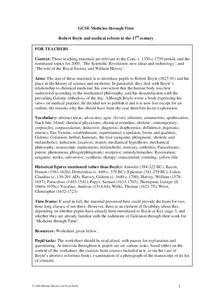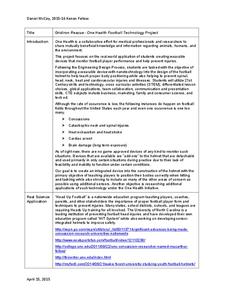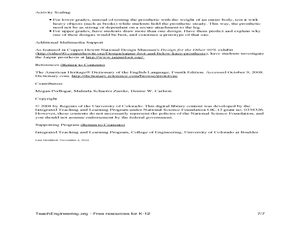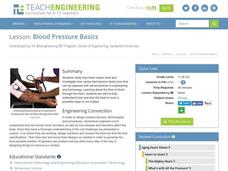Generation Rx
Medication Safety Patrol: Is It Candy or Medicine? Game
Scholars play a sorting game designed to encourage safe medication handling. They browse pictures of candy and medication, then decide which of the two they're looking at by raising a card labeled candy or medicine.
Curated OER
How to Make an Artificial Organ
Students design bionic organs or limbs. In this medical technology lesson, students view a video about artificial organs and prosthetic limbs. They research the medical technology behind these advances and work to design a organ or limb...
Michael Hunter and Fiona Kisby
Robert Boyle and Medical Reform in the 17th Century
Introduce pupils to the work of Robert Boyle and his influence on medical practice through a series of informational texts and discussion questions.
Teach Engineering
Abdominal Cavity and Laparoscopic Surgery
Get to know the human body from the inside out. The first lesson plan in a series of 10 introduces the class to the abdominopelvic cavity. Biomedical engineers need to understand the region of the body as they develop and improve...
Teach Engineering
Tissue Mechanics
Engage your class by showing them how silly putty and human tissues are alike. Pupils learn more about tissue mechanics by reflecting upon their experiences with silly putty. The instructional activity covers collagen,...
Discovery Education
Urinalysis
What do lab tests reveal about a patient's health? Scholars perform a simulated urinalysis on two different patients by testing color, pH, glucose levels, and protein levels. Then, they compare their findings to what they know passes...
Beyond Benign
Urine Jeopardy
Urine can tell us a lot about what is happening in our bodies. In a hands-on activity, scholars administer pH, glucose, ketone, and protein tests to a sample of "urine" solution made from household ingredients. Their results lead them to...
Curated OER
Medical Instrumentation
Learners analyze how medical devices that help the human body function. They work in pairs or groups to draw multiple views of the medical device and describe how engineering is used by biomedial engineers.
Kenan Fellows
Gridiron Rescue: One Health Football Technology Project
Helmets not included! Scholars brainstorm adjustments and sensors to football helmets in an engineering design project to help prevent injuries, such as concussions and spinal injuries.
Curated OER
Prosthetic Party
Students examine human anatomy by creating a prosthetic limb. In this medical engineering instructional activity, students view numerous images of prosthetics used in science today and define several medical terms associated with...
Teach Engineering
The Cloning of Cells
Did you know that there are over 200 different types of cells in the human body? One type, the stem cell, is the focus of the fifth of six installments in the Cells unit. The lesson asks the class to discuss stem cells and their...
Rochester Institue of Technology
Ergonomic Packing
Pupils revisit the concepts of ergonomics and order picking examined in previous activity and use the results of a simulation to brainstorm ergonomic designs for medical supply stations.
Curated OER
Amazon Adventure: a Case Study in Medical Technology And Bioethics
Pupils test problem-solving skills, the ability to see connections, and the ability to draw conclusions and inferences from information provided in a case study. Given a case study, they formulate a procedure and draw conclusions.
Curated OER
Amazon Adventure: A Case Study in Medical Technology and Bioethics
Students explore a case study. They use problem solving skills to determine initial procedures or experiments necessary slow disease and develop a drug. Students examine FDA drug approval procedures. They consider environmental and...
Curated OER
Circulation
Students define the functions of the circulatory system. For this body circulation lesson students see how engineers have involvement with the circulatory system.
Curated OER
We've Come a Long Way, Baby!
Middle schoolers study technology and the different reproductive technologies available today. In this human reproductive technology lesson plan students describe how engineers create technologies to improve the health of mothers...
Teach Engineering
Pill Dissolving Demo
Plop, plop, fizz, fizz, oh that one is the fastest. The teacher demonstration is the second part of a four-part series. The class observes how different pill types dissolve in simulated stomach acid. They determine which one dissolves...
Teach Engineering
Microfluidic Devices and Flow Rate
When you have to flow, you have to flow. The lesson introduces class members to microfluidic devices and their uses in medicine. They watch a short video on how the diameter affects the rate of flow. The worksheet has individuals...
Teach Engineering
How Antibiotics Work
Take two pills and call me in the morning. The first lesson plan in a short unit of four introduces class members to delivery methods of medicines. The instruction introduces the question of which delivery method is best to get you...
Teach Engineering
Blood Pressure Basics
Under pressure! The second lesson of the series introduces the class to blood pressure and the impact of high blood pressure on the cardiovascular system. It helps learners make the connection between blood pressure and how the heart...
Teach Engineering
Making Model Microfluidic Devices Using JELL-O
Nothing flows like J-E-L-L-O! In the final portion of a four-part series, pupils create scale models of microfluidic devices out of gelatin and bendable straws. They use their devices to test various flow rates in the delivery of...
Teach Engineering
Mechanics of Elastic Solids
Make the connection between Hooke's law and elasticity with an activity that introduces the class to the behavior of elastic materials. The resource defines stress and strain to calculate the modules of elasticity of...
Teach Engineering
Skin and the Effects of Ultraviolet Radiation
Though UV radiation can damage skin, it isn't all bad. The third installment in a six-part series allows the class to study the structure and function of skin. They learn about the different types of skin cancer and the SPF rating...
Teach Engineering
Nanotechnology and Cancer Treatments
Information on the biomedical use of nanotechnology, specifically in the detection and treatment of cancer, is the focus of a activity that seems like it is out of a science fiction novel. Pupils learn about electrophoresis, which is...

























